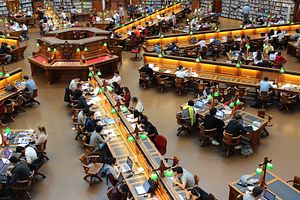The Trump administration almost dealt a massive blow to the U.S.-China relationship, the fallout of which would have critically wounded the U.S. higher education industry. According to the Financial Times, the Trump administration considered rejecting all visa applications by Chinese students. The proposal was spearheaded by Stephen Miller, whom many suspect of driving a nationalist agenda on immigration. This was on top of the new restrictions and requirements placed earlier this year on students working in fields of science and engineering.
This proposal would have had a dramatic effect on U.S. universities, which increasingly depend on international students to fill the gap caused by dwindling enrollment. It would also have hamstrung U.S. scientific research, which depends not only on the health of institutions of higher learning, but also on the labor of research assistants, teaching assistants, and other graduate students. As the article suggests, however, the Trump administration views the U.S. academic community in an unfavorable light, a view shared broadly among American conservatives.
Officially, the primary concern of the administration involves the espionage threat that Chinese students pose. This includes not simply the students themselves (especially those in science and engineering fields), but also the broader infrastructure that the Chinese government has constructed within the United States to support and monitor the student population. This administrative infrastructure is widely believed to serve as a platform for infiltration and intelligence gathering. Indeed, even some American universities have begun express concern over the growing role that Confucius Institutes play on campus.
More broadly, the proposal fits with how the Trump administration has begun to structure the U.S. relationship with China. Espionage or no, the administration believes that China is piggy-backing on U.S. educational, business, and technological acumen as a core element of its development strategy. Undercutting that development strategy holds the prospect of cutting into Chinese economic growth, and the broader growth in Chinese technological sophistication. The United States did not, after all, host many thousands of Soviet engineering students during the height of the Cold War.
Although the proposal was not adopted, it does suggest how seriously the administration is thinking about confrontation and competition with China. Moreover, given the mercurial nature of Trump and his apparently close relationship with Steven Miller, it is possible that the administration could return to this proposal in the future. Trump has not hesitated to link domestic and international priorities, and a policy that simultaneously challenges China while hamstringing an industry deeply critical of his presidency and policies might well appeal to him.
If so, the casualties inflicted by the U.S.-China trade war will increase substantially.
The views expressed here are his personal views and do not necessarily reflect those of the Department of Defense, the U.S. Army, the Army War College, or any other department or agency of the U.S. government.

































